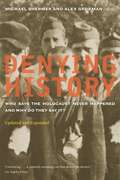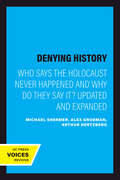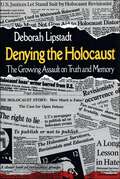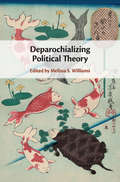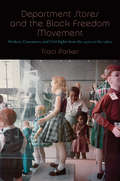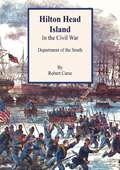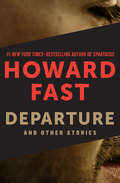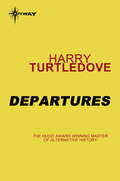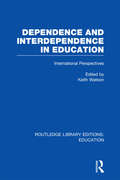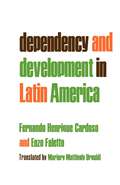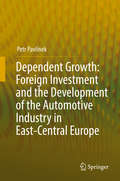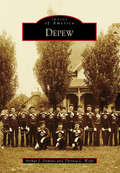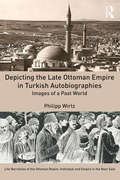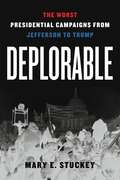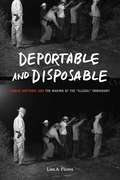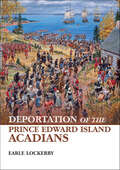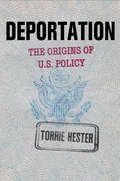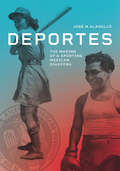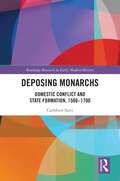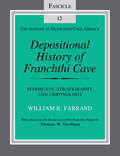- Table View
- List View
Denying History: Who Says the Holocaust Never Happened and Why Do They Say It?
by Michael Shermer Alex Grobman Arthur Hertzberg"Denying History" takes a bold and in-depth look at those who say the Holocaust never happened and explores the motivations behind such claims. While most commentators have dismissed the Holocaust deniers as antisemitic neo-Nazi thugs who do not deserve a response, historians Michael Shermer and Alex Grobman have immersed themselves in the minds and culture of these Holocaust "revisionists." In the process, they show how we can be certain that the Holocaust happened and, for that matter, how we can confirm any historical event. This edition is expanded with a new chapter and epilogue examining current, shockingly mainstream revisionism.
Denying History: Who Says the Holocaust Never Happened and Why Do They Say It? Updated and Expanded
by Michael Shermer Alex GrobmanDenying History takes a bold and in-depth look at those who say the Holocaust never happened and explores the motivations behind such claims. While most commentators have dismissed the Holocaust deniers as antisemitic neo-Nazi thugs who do not deserve a response, historians Michael Shermer and Alex Grobman have immersed themselves in the minds and culture of these Holocaust "revisionists." In the process, they show how we can be certain that the Holocaust happened and, for that matter, how we can confirm any historical event. This edition is expanded with a new chapter and epilogue examining current, shockingly mainstream revisionism.
Denying the Holocaust: The Growing Assault on Truth and Memory
by Deborah E. LipstadtThe denial of the Holocaust has no more credibility than the assertion that the earth is flat. Yet there are those who insist that the death of six million Jews in Nazi concentration camps is nothing but a hoax perpetrated by a powerful Zionist conspiracy. Sixty years ago, such notions were the province of pseudohistorians who argued that Hitler never meant to kill the Jews, and that only a few hundred thousand died in the camps from disease; they also argued that the Allied bombings of Dresden and other cities were worse than any Nazi offense, and that the Germans were the “true victims” of World War II. For years, those who made such claims were dismissed as harmless cranks operating on the lunatic fringe. But as time goes on, they have begun to gain a hearing in respectable arenas, and now, in the first full-scale history of Holocaust denial, Deborah Lipstadt shows how—despite tens of thousands of living witnesses and vast amounts of documentary evidence—this irrational idea not only has continued to gain adherents but has become an international movement, with organized chapters, “independent” research centers, and official publications that promote a “revisionist” view of recent history. Lipstadt shows how Holocaust denial thrives in the current atmosphere of value-relativism, and argues that this chilling attack on the factual record not only threatens Jews but undermines the very tenets of objective scholarship that support our faith in historical knowledge. Thus the movement has an unsuspected power to dramatically alter the way that truth and meaning are transmitted from one generation to another.
Denys Arcand's Le Declin de l'empire americain and Les Invasions barbares
by Andrê LoiselleThe release of Denys Arcand's Le Déclin de l'empire américain (The Decline of the American Empire) in 1986 marked a major turning point in Quebec cinema. It was the first Québécois film that enjoyed huge critical and commercial success at home and abroad. Arcand's tragicomedy about eight intellectuals gathered around a dinner table relating sexy anecdotes became the top-grossing film of all time in Quebec and was the first Canadian feature to be nominated for an Oscar in the foreign-language category. Seventeen years later, Arcand won an Academy Award for the sequel, Les Invasions barbares (The Barbarian Invasions), where the amusing insouciance of the thirty-somethings talking dirty in Le Déclin is replaced by a sense of moral responsibility and serene resignation. In this engrossing study, André Loiselle presents the first in-depth analysis of both films within the context of Quebec culture. Through close readings and concise cultural analysis of two of the most important films in the history of Quebec cinema, Loiselle demonstrates the ways in which Arcand's work represents a snapshot of the evolution of the French Canadian film industry since 1980. The companion films trace the decline of Quebec's national dream and the Québécois' attempts to cling to their identity against the forces of barbaric globalization. The second title in the new Canadian Cinema series, Denys Arcand's "Le Déclin de l'empire américain" and "Les Invasions barbares" is essential reading for cinephiles, film critics, and anyone with an interest in cultural studies and Canadian and Quebec history.
Deparochializing Political Theory
by Melissa S. WilliamsIn a world no longer centered on the West, what should political theory become? Although Western intellectual traditions continue to dominate academic journals and course syllabi in political theory, up-and-coming contributions of 'comparative political theory' are rapidly transforming the field. Deparochializing Political Theory creates a space for conversation amongst leading scholars who differ widely in their approaches to political theory. These scholars converge on the belief that we bear a collective responsibility to engage and support the transformation of political theory. In these exchanges, 'deparochializing' political theory emerges as an intellectual, educational and political practice that cuts across methodological approaches. Because it is also an intergenerational project, this book presses us to re-imagine our teaching and curriculum design. Bearing the marks of its beginnings in East Asia, Deparochializing Political Theory seeks to de-center Western thought and explore the evolving tasks of political theory in an age of global modernity.
Department Stores and the Black Freedom Movement: Workers, Consumers, and Civil Rights from the 1930s to the 1980s (The John Hope Franklin Series in African American History and Culture)
by Traci ParkerIn this book, Traci Parker examines the movement to racially integrate white-collar work and consumption in American department stores, and broadens our understanding of historical transformations in African American class and labor formation. Built on the goals, organization, and momentum of earlier struggles for justice, the department store movement channeled the power of store workers and consumers to promote black freedom in the mid-twentieth century. Sponsoring lunch counter sit-ins and protests in the 1950s and 1960s, and challenging discrimination in the courts in the 1970s, this movement ended in the early 1980s with the conclusion of the Sears, Roebuck, and Co. affirmative action cases and the transformation and consolidation of American department stores. In documenting the experiences of African American workers and consumers during this era, Parker highlights the department store as a key site for the inception of a modern black middle class, and demonstrates the ways that both work and consumption were battlegrounds for civil rights.
Department of the South: Hilton Head Island in the Civil War
by Robert CarseStep back into the tumultuous era of the American Civil War with Robert Carse's Department of the South: Hilton Head Island in the Civil War. This compelling historical account delves into the strategic importance of Hilton Head Island, a vital Union stronghold and headquarters for the Department of the South. Carse meticulously chronicles the island's transformation from a quiet Southern community to a bustling military hub, shedding light on the lives of soldiers, freed slaves, and residents whose worlds were forever changed by the war.Through detailed narratives and vivid illustrations, Carse brings to life the battles, skirmishes, and daily challenges faced by those stationed on Hilton Head Island. Readers will explore the military strategies, leadership decisions, and logistical efforts that made the island a critical base for Union operations in the South. The book also provides a poignant look at the human side of war, capturing the resilience, hardships, and moments of hope experienced by the people who lived through this defining period in American history.Department of the South is a must-read for Civil War enthusiasts, historians, and anyone interested in the rich tapestry of America's past. Carse's engaging storytelling and thorough research offer a profound understanding of Hilton Head Island's pivotal role in the Civil War, making this book an essential addition to any history lover's collection.
Departure: And Other Stories
by Howard FastStories of courage against oppression by one of twentieth-century America&’s most fearless writersThese nineteen stories follow the paths of men and women, immigrants, minorities, and the poor, suffering from injustice and inequality. Written in the 1940s, Fast&’s clear-eyed and lively tales examine a world reeling from war and plagued by social unrest. With stories set in New York City, Europe, and India, this collection shares a remarkable global vision. Written during the rising Communist scare, Departure is a defiantly leftist portrait of a complex and ever-changing world. This ebook features an illustrated biography of Howard Fast including rare photos from the author&’s estate.
Departures
by Harry TurtledoveWhat if history had taken a different path, made a detour, and deviated just a little bit from the road it chose? Here, Harry Turtledove explores such "what ifs" in twenty alternate-history stories ranging from ancient times to the far, far-different future.Persia has conquered Greece; Athens is in ruins. Yet even under Persia's rule, the power of the people can never be completely broken...A werewolf boy tears through Cologne's medieval streets in search of sanctuary from the angry mob. But who will shelter a creature so hated and feared?A student from the far-off future sets off on a field trip to study Genghis Khan - and finds him in the twentieth century?And many more!
Depeche Mode: The Secret History (The\secret History Of Rock Ser.)
by Alan CrossAlan Cross is the preeminent chronicler of popular music.Here he provides a history of electronic pioneers Depeche Mode.This look at the group—"Music for the Masses—and Then Some"—is adapted from the audiobook of the same name.
Dependence and Interdependence in Education: International Perspectives (Routledge Library Editions: Education)
by Keith WatsonThis volume provides an international perspective on educational dependency in considering both theories and actual developments throughout the world. Some less developed countries, in expanding their education systems, have emulated Western academic-style systems and have increased their dependence on Western models in various respects including examination validation. Others have deliberately avoided this path and have experimented with systems more ‘relevant’ to development, often in a radical way. At a theoretical level, Marxist and neo-Marxist development theorists argue that education systems dependent on the West are evidence of economic dependency and confirmation of Marxist development theories; while others argue that the evidence suggests an interdependent world and that dependency theories do not apply in education.
Dependency and Development in Latin America
by Fernando Henrique Cardoso Enzo FalettoAt the end of World War II, several Latin American countries seemed to be ready for industrialization and self-sustaining economic growth. Instead, they found that they had exchanged old forms of political and economic dependence for a new kind of dependency on the international capitalism of multinational corporations. In the much-acclaimed original Spanish edition (Dependencia y Desarrollo en América Latina) and now in the expanded and revised English version, Cardoso and Faletto offer a sophisticated analysis of the economic development of Latin America.The economic dependency of Latin America stems not merely from the domination of the world market over internal national and "enclave" economies, but also from the much more complex interact ion of economic drives, political structures, social movements, and historically conditioned alliances. While heeding the unique histories of individual nations, the authors discern four general stages in Latin America's economic development: the early outward expansion of newly independent nations, the political emergence of the middle sector, the formation of internal markets in response to population growth, and the new dependence on international markets. In a postscript for this edition, Cardoso and Faletto examine the political, social and economic changes of the past ten years in light of their original hypotheses.
Dependent Growth: Foreign Investment and the Development of the Automotive Industry in East-Central Europe
by Petr PavlínekThis book offers a critical analysis of recent developments in the automotive industry of East-Central Europe (ECE). Economists, industry specialists and national governments have considered the rapid development of the automotive industry in ECE in the past twenty years an unqualified success. This rapid growth has been based on large inflows of foreign direct investment (FDI) from Western Europe, North America, Japan and South Korea, and it significantly contributed to GDP growth, created thousands of new jobs, and completely transformed the previously existing automotive industry in the region. This volume offers an analysis that goes beyond uncritical celebratory accounts of this rapid growth. It is based on original, detailed firm-level research conducted by the author in Czechia and Slovakia between 2009 and 2015 that covered assembly firms and the networks of component suppliers. Theoretically and conceptually, the analysis will draw on the global production networks and global value chains perspectives. Drawing on the original empirical data and on additional available information, this volume concentrates on several important questions related to the development of the automotive industry in ECE in the 2000s:• The role of FDI in the rapid development of the automotive industry after 1990 and particularly in the 2000s.• The upgrading of the automotive industry in East-Central Europe through FDI• The position of ECE in the automotive industry research and development (R&D)• The effects of the 2008-2009 economic crisis in the automotive industry of ECE.• The role of state in the rapid development of the automotive industry in ECE in the 1990s and 2000s.• The effects of FDI on domestic firms in the form of linkages between foreign-owned and domestic firms and spillovers from foreign-owned to domestic firms.
Depew
by Arthur J. Domino Theresa L. WolfeWhen some of the richest men in America, including John Jacob Astor, realized in the 1890s that the New York Central, Lehigh Valley, Erie, and Delaware, Lackawanna & Western Railroads passed through a one-mile corridor, they began planning a community. In 1892, the renowned firm of Olmsted, Olmsted & Eliot designed a residential development surrounding manufacturing facilities. In 1894, it was incorporated as the village of Depew. The first tenant, the New York Central Locomotive Works, attracted a number of railroad-related industries, and Depew continued to grow until advances in technology and the Depression caused the New York Central to withdraw in 1931. Gradually, others such as Magnus Metal, National Battery, and Symington-Gould were phased out. Depew would never become a vast industrial complex as first planned, but today, the village is a mixture of residential and commercial development.
Depicting the Late Ottoman Empire in Turkish Autobiographies: Images of a Past World (Life Narratives of the Ottoman Realm: Individual and Empire in the Near East #1)
by Philipp WirtzThe period between the 1880s and the 1920s was a time of momentous changes in the Ottoman Empire. It was also an age of literary experiments, of which autobiography forms a part. This book analyses Turkish autobiographical narratives describing the part of their authors’ lives that was spent while the Ottoman Empire still existed. The texts studied in this book were written in the cultural context of the Turkish Republic, which went to great lengths to disassociate itself from the empire and its legacy. This process has only been criticised and partially reversed in very recent times, the resurging interest in autobiographical texts dealing with the "old days" by the Turkish reading public being part of a wider, renewed regard for Ottoman legacies. Among the analysed texts are autobiographies by writers, journalists, soldiers and politicians, including classics like Halide Edip Adıvar and Şevket Süreyya Aydemir, but also texts by authors virtually unknown to Western readers, such as Ahmed Emin Yalman. While the official Turkish republican discourse went towards a dismissal of the imperial past, autobiographical narratives offer a more balanced picture. From the earliest memories and personal origins of the authors, to the conflict and violence that overshadowed private lives in the last years of the Ottoman Empire, this book aims at showing examples of how the authors painted what one of them called "images of a past world."
Deplorable: The Worst Presidential Campaigns from Jefferson to Trump
by Mary E. StuckeyPolitical campaigns in the United States, especially those for the presidency, can be nasty—very nasty. And while we would like to believe that the 2020 election was an aberration, insults, invective, and yes, even violence have characterized US electoral politics since the republic’s early days. By examining the political discourse around nine particularly deplorable elections, Mary E. Stuckey seeks to explain why. From the contest that pitted Thomas Jefferson against John Adams in 1800 through 2020’s vicious, chaotic matchup between Donald Trump and Joe Biden, Stuckey documents the cycle of despicable discourse in presidential campaigns. Looking beyond the character and the ideology of the candidates, Stuckey explores the broader political, economic, and cultural milieus in which each took place. In doing so, she reveals the conditions that exacerbate and enable our worst political instincts, producing discourses that incite factions, target members of the polity, encourage undemocratic policy, and actively work against the national democratic project.Keenly analytical and compulsively readable, Deplorable provides context for the 2016 and 2020 elections, revealing them as part of a cyclical—and perhaps downward-spiraling—pattern in American politics. Deplorable offers more than a comparison of the worst of our elections. It helps us understand these shameful and disappointing moments in our political history, leaving one important question: Can we avoid them in the future?
Deplorable: The Worst Presidential Campaigns from Jefferson to Trump
by Mary E. StuckeyPolitical campaigns in the United States, especially those for the presidency, can be nasty—very nasty. And while we would like to believe that the 2020 election was an aberration, insults, invective, and yes, even violence have characterized US electoral politics since the republic’s early days. By examining the political discourse around nine particularly deplorable elections, Mary E. Stuckey seeks to explain why. From the contest that pitted Thomas Jefferson against John Adams in 1800 through 2020’s vicious, chaotic matchup between Donald Trump and Joe Biden, Stuckey documents the cycle of despicable discourse in presidential campaigns. Looking beyond the character and the ideology of the candidates, Stuckey explores the broader political, economic, and cultural milieus in which each took place. In doing so, she reveals the conditions that exacerbate and enable our worst political instincts, producing discourses that incite factions, target members of the polity, encourage undemocratic policy, and actively work against the national democratic project.Keenly analytical and compulsively readable, Deplorable provides context for the 2016 and 2020 elections, revealing them as part of a cyclical—and perhaps downward-spiraling—pattern in American politics. Deplorable offers more than a comparison of the worst of our elections. It helps us understand these shameful and disappointing moments in our political history, leaving one important question: Can we avoid them in the future?
Deportable and Disposable: Public Rhetoric and the Making of the “Illegal” Immigrant (Rhetoric and Democratic Deliberation #24)
by Lisa A. FloresIn the 1920s, the US government passed legislation against undocumented entry into the country, and as a result the figure of the "illegal alien" took form in the national discourse. In this book, Lisa A. Flores explores the history of our language about Mexican immigrants and exposes how our words made these migrants "illegal."Deportable and Disposable brings a rhetorical lens to a question that has predominantly concerned historians: how do differently situated immigrant populations come to belong within the national space of whiteness, and thus of American-ness? Flores presents a genealogy of our immigration discourse through four stereotypes: the "illegal alien," a foreigner and criminal who quickly became associated with Mexican migrants; the "bracero," a docile Mexican contract laborer; the "zoot suiter," a delinquent Mexican American youth engaged in gang culture; and the "wetback," an unwanted migrant who entered the country by swimming across the Rio Grande. By showing how these figures were constructed, Flores provides insight into the ways in which we racialize language and how we can transform our political rhetoric to ensure immigrant populations come to belong as part of the country, as Americans.Timely, thoughtful, and eye-opening, Deportable and Disposable initiates a necessary conversation about the relationship between racial rhetoric and the literal and figurative borders of the nation. This powerful book will inform policy makers, scholars, activists, and anyone else interested in race, rhetoric, and immigration in the United States.
Deportable and Disposable: Public Rhetoric and the Making of the “Illegal” Immigrant (Rhetoric and Democratic Deliberation)
by Lisa A. FloresIn the 1920s, the US government passed legislation against undocumented entry into the country, and as a result the figure of the “illegal alien” took form in the national discourse. In this book, Lisa A. Flores explores the history of our language about Mexican immigrants and exposes how our words made these migrants “illegal.”Deportable and Disposable brings a rhetorical lens to a question that has predominantly concerned historians: how do differently situated immigrant populations come to belong within the national space of whiteness, and thus of American-ness? Flores presents a genealogy of our immigration discourse through four stereotypes: the “illegal alien,” a foreigner and criminal who quickly became associated with Mexican migrants; the “bracero,” a docile Mexican contract laborer; the “zoot suiter,” a delinquent Mexican American youth engaged in gang culture; and the “wetback,” an unwanted migrant who entered the country by swimming across the Rio Grande. By showing how these figures were constructed, Flores provides insight into the ways in which we racialize language and how we can transform our political rhetoric to ensure immigrant populations come to belong as part of the country, as Americans.Timely, thoughtful, and eye-opening, Deportable and Disposable initiates a necessary conversation about the relationship between racial rhetoric and the literal and figurative borders of the nation. This powerful book will inform policy makers, scholars, activists, and anyone else interested in race, rhetoric, and immigration in the United States.
Deportation of the Prince Edward Island Acadians
by Earle LockerbyWhen the fortress of Louisbourg fell to the British in 1758, the Acadians of Prince Edward Island (then known as Île Saint-Jean) were doomed to a horrible fate—deportation from their homes to an unknown land thousands of kilometres away. Shipwrecks and disease took a terrible toll during the voyage to France, and hundreds of the approximately three thousand deportees lost their lives. Earle Lockerby's meticulously researched account sheds new light on this tragic event, from its implementation to the experiences of the Acadians who eluded British troops and escaped to the mainland, to the deportees' arrival in Europe. Featuring excerpts from original documents and letters, Deportation of the Prince Edward Island Acadians is an important record of this neglected chapter in the saga of the Acadian people.Now Fred, Mai, and Grace, extraordinary fossil hunters, are at the Fortress of Louisbourg hunting a different kind of treasure. They are secretly excavating the historic site, trying to find a mass of jewels Fred’s ancestor may have buried there—jewels that could save Fred’s family. But Fred uncovers far more than he bargained for, including a dangerous plot that could leave Fred’s family in even more serious trouble.The young detectives from the bestselling The Fossil Hunter of Sydney Mines shine in this fast-paced mystery for middle readers.
Deportation: The Origins of U.S. Policy
by Torrie HesterBefore 1882, the U.S. federal government had never formally deported anyone, but that year an act of Congress made Chinese workers the first group of immigrants eligible for deportation. Over the next forty years, lawmakers and judges expanded deportable categories to include prostitutes, anarchists, the sick, and various kinds of criminals. The history of that lengthening list shaped the policy options U.S. citizens continue to live with into the present.Deportation covers the uncertain beginnings of American deportation policy and recounts the halting and uncoordinated steps that were taken as it emerged from piecemeal actions in Congress and courtrooms across the country to become an established national policy by the 1920s. Usually viewed from within the nation, deportation policy also plays a part in geopolitics; deportees, after all, have to be sent somewhere. Studying deportations out of the United States as well as the deportation of U.S. citizens back to the United States from abroad, Torrie Hester illustrates that U.S. policy makers were part of a global trend that saw officials from nations around the world either revise older immigrant removal policies or create new ones.A history of immigration policy in the United States and the world, Deportation chronicles the unsystematic emergence of what has become an internationally recognized legal doctrine, the far-reaching impact of which has forever altered what it means to be an immigrant and a citizen.
Deportes: The Making of a Sporting Mexican Diaspora (Latinidad: Transnational Cultures in the United States)
by José M AlamilloSpanning the first half of the twentieth century, Deportes uncovers the hidden experiences of Mexican male and female athletes, teams and leagues and their supporters who fought for a more level playing field on both sides of the border. Despite a widespread belief that Mexicans shunned physical exercise, teamwork or “good sportsmanship,” they proved that they could compete in a wide variety of sports at amateur, semiprofessional, Olympic and professional levels. Some even made their mark in the sports world by becoming the “first” Mexican athlete to reach the big leagues and win Olympic medals or world boxing and tennis titles. These sporting achievements were not theirs alone, an entire cadre of supporters—families, friends, coaches, managers, promoters, sportswriters, and fans—rallied around them and celebrated their athletic success. The Mexican nation and community, at home or abroad, elevated Mexican athletes to sports hero status with a deep sense of cultural and national pride. Alamillo argues that Mexican-origin males and females in the United States used sports to empower themselves and their community by developing and sustaining transnational networks with Mexico. Ultimately, these athletes and their supporters created a “sporting Mexican diaspora” that overcame economic barriers, challenged racial and gender assumptions, forged sporting networks across borders, developed new hybrid identities and raised awareness about civil rights within and beyond the sporting world.
Deposing Monarchs: Domestic Conflict and State Formation, 1500-1700
by Cathleen SartiDeposing Monarchs analyses depositions in Northern Europe between 1500 and 1700 as a type of frequent political conflict which allows to present new ideas on early modern state formation, monarchy, and the conventions of royal rulership. The book revises earlier conceptualizations of depositions as isolated, unique events that emerged in the context of national historiographies. An examination of the official legitimations of depositions reveals that in times of crisis, concepts of tradition, rule of law, and political consensus are much more influential than the divine right of kings. Tracing the similarities and differences of depositions in Northern Europe transnationally and diachronically, the book shows monarchical succession as more non-linear than previously presumed. It offers a transferable model of the different elements needed in depositions, such as opposition to the monarch by multiple groups in a realm, the need for a convincing rival candidate, and a legitimation based on political traditions or religious ideas. Furthermore, the book bolsters our understanding of authority and rule as a constant process of negotiation, adding to recent research on political culture, and on the cultural history of politics.
Deposing Monarchs: Domestic Conflict and State Formation, 1500-1700 (Routledge Research in Early Modern History)
by Cathleen SartiDeposing Monarchs analyses depositions in Northern Europe between 1500 and 1700 as a type of frequent political conflict which allows to present new ideas on early modern state formation, monarchy, and the conventions of royal rulership. The book revises earlier conceptualizations of depositions as isolated, unique events that emerged in the context of national historiographies. An examination of the official legitimations of depositions reveals that in times of crisis, concepts of tradition, rule of law, and political consensus are much more influential than the divine right of kings. Tracing the similarities and differences of depositions in Northern Europe transnationally and diachronically, the book shows monarchical succession as more non-linear than previously presumed. It offers a transferable model of the different elements needed in depositions, such as opposition to the monarch by multiple groups in a realm, the need for a convincing rival candidate, and a legitimation based on political traditions or religious ideas. Furthermore, the book bolsters our understanding of authority and rule as a constant process of negotiation, adding to recent research on political culture, and on the cultural history of politics.
Depositional History of Franchthi Cave: Sediments, Stratigraphy, and Chronology (Excavations at Franchthi Cave, Greece #12)
by William R. Farrand“Presents detailed descriptions of the physical and depositional characteristics, strata, and radiocarbon chronology of Franchthi.” —Journal of Anthropological ResearchThis fascicle describes the background of the Franchthi project and its excavation history and methodology. Particle size, mineralogy, and chemistry are all taken into consideration as the cultural remains and the sediments from the cave are analyzed to determine their origin and history. William Farrand constructs an integrated stratigraphy for the entire cave using excavators’ notes, laboratory analyses, and personal field data to correlate sequences in separate trenches. On the basis of some 60 radiocarbon dates, the evolution and chronology of the sedimentary fill is postulated.
